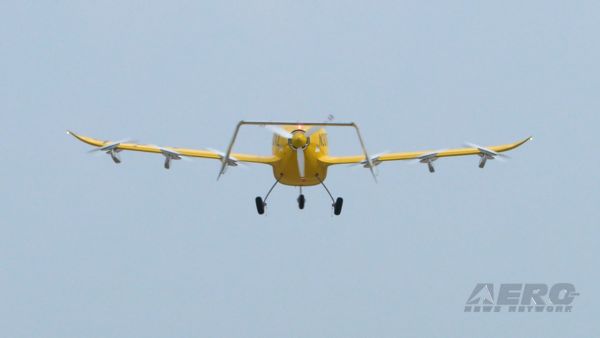Sat, Mar 26, 2016
Projects Significant Growth In The UAS Sector
The FAA has released its annual Aerospace Forecast Report Fiscal Years 2016 to 2036 that projects a sustained increase in overall air travel and the use of Unmanned Aircraft Systems (UAS).

A key portion of the forecast focuses on projections for the growth in the use of unmanned aircraft, also known as drones. The FAA estimates small, hobbyist UAS purchases may grow from 1.9 million in 2016 to as many as 4.3 million by 2020. Sales of UAS for commercial purposes are expected to grow from 600,000 in 2016 to 2.7 million by 2020. Combined total hobbyist and commercial UAS sales are expected to rise from 2.5 million in 2016 to 7 million in 2020.
Predictions for small UAS used in the commercial fleet are more difficult to develop given the dynamic, quickly-evolving nature of the market. Both sales and fleet size estimates share certain broad assumptions about operating limitations for small UAS during the next five years: daytime operations, within visual line of sight, and a single pilot operating only one small UAS at a time. The main difference in the high and low end of the forecasts is differing views on how those limitations will influence the widespread use of UAS for commercial purposes.
Looking at commercial air travel, Revenue Passenger Miles (RPMs) are considered the benchmark for measuring aviation growth. An RPM is one revenue passenger traveling one mile. The FAA forecast calls for system RPMs by mainline and regional air carriers to grow at an average rate of 2.6 percent a year between 2016 and 2036, with international RPMs projected to increase 3.5 percent a year, doubling over the forecast period. Domestic RPMs are forecast to increase by more than 50 percent over the same time. In 2015, system RPMs by U.S. carriers grew from 857 billion to 889 billion, a 3.8 percent increase.

The FAA’s NextGen program is helping to meet this consistent aviation growth. NextGen focuses on implementing technologies and procedures that utilize satellite-based aircraft navigation and phase out efficiency limitations of the current ground-based radar navigation system. For example, the environmental and economic gains of reduced fuel usage associated with NextGen advancements are projected to achieve a savings of billions of dollars in airline operational costs and achieve sustainable aviation growth.
Proven economic data that utilize sources such as generally accepted projections for the nation’s GDP are used in the FAA annual forecast, which has consistently made it the industry-wide standard of U.S. aviation-related activities. The report looks at all facets of air travel including commercial airlines, air cargo, private general aviation, and fleet sizes.
(Source: FAA news release. Images from file)
More News
States That Current Process is Damaging National Aerospace Development US Senator Jerry Morgan is pushing the FAA to speed up the process for rocket launch licensing. He argues tha>[...]
From 2015 (YouTube Edition): Model Aviator Aims For Full-Scale Career While at the 2015 Indoor Electric RC Festival, referred to as eFest, ANN CEO and Editor-In-Chief, Jim Campbell>[...]
Dave Juwel's Aviation Marketing Stories ITBOA BNITBOB ... what does that mean? It's not gibberish, it's a lengthy acronym for "In The Business Of Aviation ... But Not In The Busine>[...]
Aero Linx: Cardinal Flyers Online The Cardinal Flyers Online Web site was created and is maintained by me, Keith Peterson. My wife Debbie and I have owned a 1976 RG since 1985. Wit>[...]
Clearance Void If Not Off By (Time) Used by ATC to advise an aircraft that the departure release is automatically canceled if takeoff is not made prior to a specified time. The exp>[...]
 Senator Pushes FAA to Accelerate Rocket Launch Licensing
Senator Pushes FAA to Accelerate Rocket Launch Licensing Classic Aero-TV: RJ Gritter - Part of Aviations Bright New Future
Classic Aero-TV: RJ Gritter - Part of Aviations Bright New Future Aero-FAQ: Dave Juwel's Aviation Marketing Stories -- ITBOA BNITBOB
Aero-FAQ: Dave Juwel's Aviation Marketing Stories -- ITBOA BNITBOB ANN's Daily Aero-Linx (10.27.24)
ANN's Daily Aero-Linx (10.27.24) ANN's Daily Aero-Term (10.27.24): Clearance Void If Not Off By (Time)
ANN's Daily Aero-Term (10.27.24): Clearance Void If Not Off By (Time)




